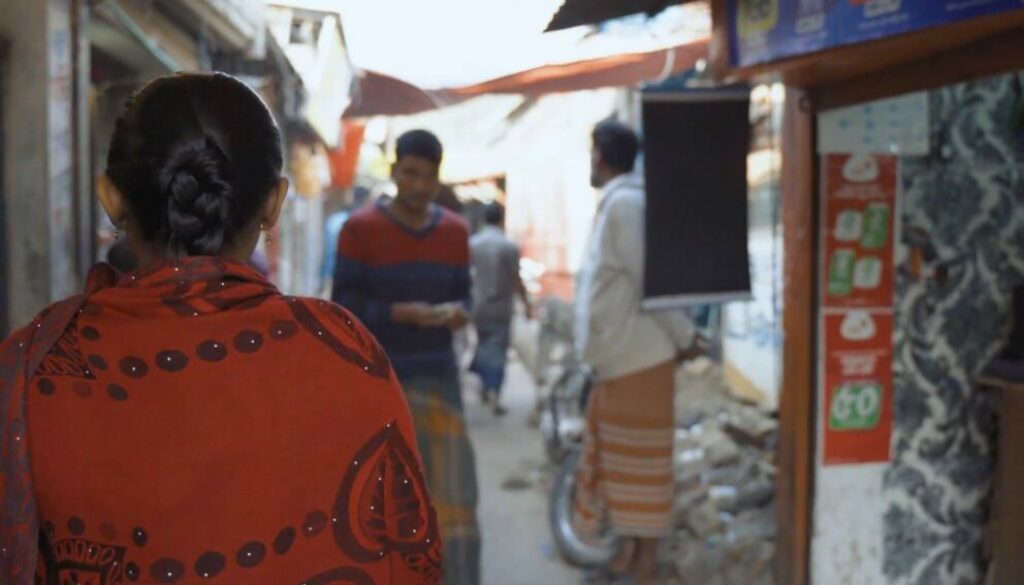Harassment in Informal Settlements in Dhaka
By Wafa Alam, Shafinaz Sobhan and Bachera Aktar
Everyday many young men and women migrate to Dhaka city from rural areas of Bangladesh in search of work and in hope of a better life. Many of these people end up in informal settlements where they live in unhealthy and unsafe conditions, often subjected to harassment.
According to the Bangladesh Bureau of Statistics 2015, there are more than 3,000 informal settlements in Dhaka, with over 1 million households. Unfortunately, people living in those informal settlements are exposed to higher degree of violence and crime. Traditional gender roles often make adolescent girls and young women more prone to different forms of harassment, be it at home, in the community and on the streets.
What harassment do women face?
The types of harassment faced by young women in the slums of Dhaka ranges from name calling and bad comments to giving perverse looks, inappropriate touching, physical abuse and sexual harassment. School and college going girls, women living away from their husbands, and female garment workers are particularly vulnerable to such abuse.
The ‘mastaans’ (local goons), local shopkeepers and sometimes the unemployed boys tease girls and young women in the streets. During one of our visits to a slum in Dhaka, an adolescent boy said:
These powerful men (mastaans) tease girls and they know no one will protest because of their strong political backup.
These practices are often so normalized and socially perpetuated that people don’t even protest, let alone report incidents.
Stigma and blame
There is widespread stigma associated with harassment which means that it is often young girls, and not the abuser who is held responsible. This also means that families stop girls and women from seeking justice for fear of having their reputation tarnished. A young girl residing in Korail slum said:
My mother thinks that if I act (dress and behave) properly, then everything will be fine, but if I don’t, then boys will definitely say things.
She also said that when boys teased her on the streets, her mother told her not to give an ear to such comments. Her mother always tells her:
You are born as a girl, and you should behave like one. You don’t have to show that you are brave.
Incidents of harassment are often not shared with anyone due to fear of being blamed. One study reported that only 2.1% of the women inform community leaders about their experience of domestic violence, while 1.1% of the women seek police’s help.
A survey conducted by Save the Children showed that around 80% of the girls living in informal settlements in Dhaka are married off before the age of 18 and one of the reasons for early marriage was also found to be fear of sexual harassment. Young girls are restricted from going out alone, or going out at night due to safety concerns in the community. Together with all the issues explained above, the long existing practices of child marriage and other issues are perpetuated when a girl reports an incident of harassment, further depriving them of their basic human rights like education. This is aggravated by the lack of support from community and law enforcement.
Imperfect justice
In the few cases of harassment that are actually reported, police are either reluctant to get involved, or are in favor of the accused. There have been cases were the police coerced the victims to settle the matter out of court, or fix marriage between the victim and the accused, as they receive financial benefits from doing so.
Parents of the victims also seek help from local community leaders. The local leaders hold ‘shalish’ (informal court) where the accused may be beaten or charged a fine, if found guilty, or even forced into marriage. However, there are incidents where these local leaders also seem to only take strict action in case of influential people, and in other instances they victimize people who do not have important connections in the community. The consequences are often, if not always, faced by the girls and their families. If the families try to protest, they may be forced to vacate their house and move to another area.
However, over the years, communities have become more responsive towards incidents of harassment in their slums. Slum chairman, club presidents and members hold regular meetings where they talk to family members, men and women, and help them solve such problems. Women are now more concerned about their own safety due to awareness campaigns, rallies and the influence of the media.
These measures still do not consider that incidents of harassment are heavily under-reported. Moreover, while the situation has largely improved, there is still a long way to go before the communities transform into conducive support networks for the victims and harassment is indiscriminately eliminated.
